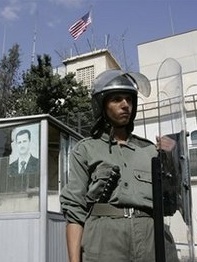
Predictably, Damascus condemned the strike as unprovoked U.S. aggression. One might have thought, given the Asad regime’s documented ties with Al Qaeda, Baghdad would have had less of a problem with the U.S. cross-border raid. Yet Iraq-like North Korea and many Arab states-roundly condemned the operation.
In the days following the strike, there have been large government-sanctioned demonstrations in Syria protesting the U.S. military action. No doubt, popular outrage over the loss of innocent civilians is genuine. Seemingly lost on the protesters, however, was the fact that the target was Al Qaeda-which was widely believed to have been behind an early October car bomb that killed 17 in Damascus. Of course, this oversight is understandable: the Syrian government-controlled print media neglected to mention the Al Qaeda connection to the strike.
The Asad regime’s response to the attack stands in stark contrast to its reaction to the September 2007 Israeli strike on Syria’s nuclear weapons facility in Al Kibar. Relatively speaking, Israel’s audacious raid hardly elicited a protest. Indeed, although Syria accused Washington as having been “party to the execution” of the Israeli attack, unlike this week, the United States did not have to close the embassy, nor did the Asad regime respond by shuttering the American School and cultural center in Damascus.
Many analysts both in the region and in Washington are saying that the strike was politically motivated, with some even speculating it was authorized by the few remaining “hawks” in the administration intent on rolling back the seemingly inevitable march toward U.S. diplomatic re-engagement with Syria. Given the Bush administration’s long-standing policy of hot pursuit, however, this line of thinking seems rather conspiratorial. More likely, the decision to cross the border was made by commanders on the ground eager to take advantage of actionable intelligence on a high-value target.
In the short term, the strike may derail eleventh-hour Bush administration efforts to engage the Asad regime, but it is unlikely to have any lasting impact should either President Obama or McCain determine to initiate dialogue with Damascus. The U.S. strike will also have no bearing-as some have argued -on whether Damascus will ultimately split from Tehran. Even the most ardent advocates for U.S. diplomatic re-engagement with Syria no longer believe this type of strategic reorientation is possible.
What’s more, there is very little evidence to suggest a correlation between Washington’s posture and Syrian behavior. Syrian behavior is not necessarily any more appealing-either domestically or in regard to its neighbors-when Washington takes a conciliatory tack.
Just compare events of this week to what happened in April 2007, shortly after House Speaker Nancy Pelosi traveled to Damascus for a cordial meeting with President Asad. The similarities in the headlines are uncanny. Days after the U.S. airstrike, the Asad regime sentenced twelve Syrian liberals to two and a half years in prison for signing the Damascus Declaration-including Riad Seif, who suffers from advanced prostate cancer. In 2007, judging from the pictures of Asad and Pelosi strolling and shopping in Suq al-Hamadiyeh, conciliation was in the air. Yet days after Pelosi’s departure, Asad sentenced six leading dissidents to harsh jail terms of three to twelve years.
Nearly five years after the invasion of Iraq, the fact that high-value, high-profile Al Qaeda figures continue to operate on the Syrian side of the border-even after Damascus dispatched an ambassador to Baghdad-should be instructive. If the past thirty years are any guide, regardless of what Washington does, Damascus will likely remain a problem. Whether Obama or McCain comes to the White House in January, it would be advisable for the next administration to diminish expectations of what diplomatic engagement with Damascus can achieve.


